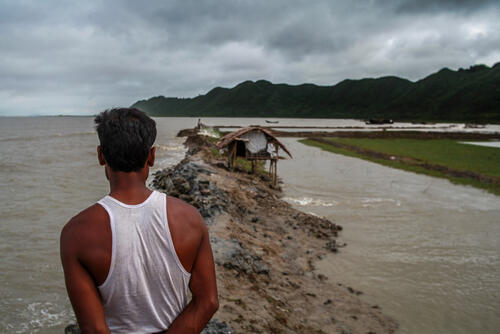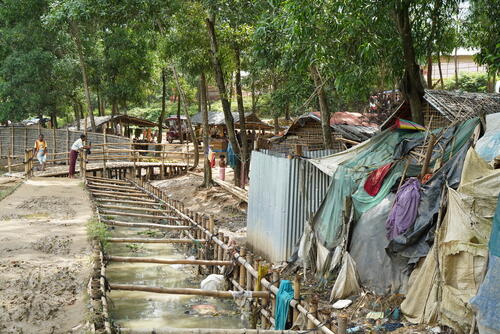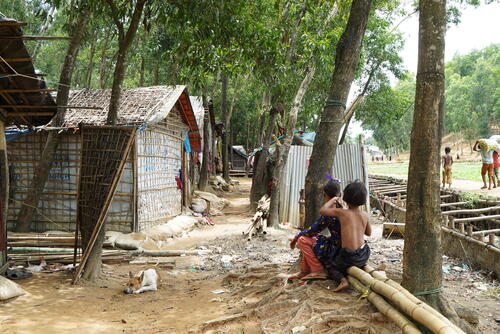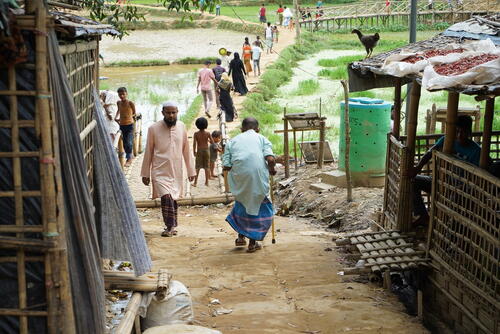Suleiman is an MSF watchman living in Nget Chaung village, central Rakhine State, Myanmar. He, along with 9,000 other Rohingya Muslims here, is denied freedom of movement, forcibly confined to the village and the adjacent internment camp, with poor living conditions and very limited access to basic services.
The restrictions on movement for the Rohingya in central Rakhine State followed outbreaks of violence between the Rohingya and Rakhine communities in 2012. Today, some 128,000 Rohingya and other Muslims are forcibly detained in camps or camp-like settings in Central Rakhine.
Before these restrictions were imposed, Suleiman was a teacher, travelling to different townships and cities to provide English and Burmese classes in mosques.
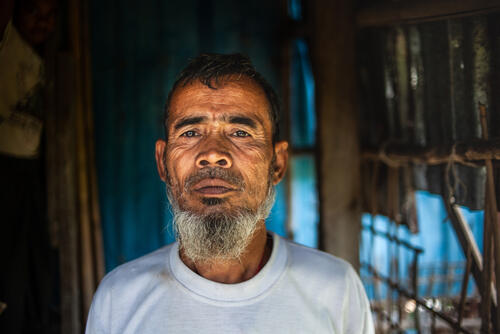
“I was born in Nget Chaung village and my entire family lives here. My wife and I have eight children and I work as a watchman for MSF’s medical clinic. MSF arrived in Nget Chaung just after the crisis in 2012; they started working here just seven days after we were attacked.
When I was a child I went to Sittwe for my education. But when I was 15, we just didn’t have the money for me to keep going to school. So after completing my primary school education, I came home and ended up living in the mosque.
I began to make a living as a teacher, running classes in English and Burmese for the children and adults coming to the mosque.
I was working in another village nearby when the crisis began in 2012 – I came home quickly and things were tense.
One night we woke up at about two in the morning; we could hear people outside. We got dressed silently and crept outside.
It was dark and we couldn’t see well, but there were a lot of people who weren’t from our village; we knew we had to get away. We used the houses for cover, ducking behind things so that we wouldn’t be seen, then we ran.
We ran a long way away and found places to hide. When we looked back at the village, we saw big fires. We decided to stay where we were until early the next morning, then we walked back.
When we got back, many of our houses were gone – they had been burnt, my house included. All our cows and goats were gone too.
A police officer came to see what had happened. He looked around and saw the damage and then he left.
For a long time after that we lived in tents nearby. It took almost two years to rebuild everything. Soon after our houses were burnt, some soldiers came to speak with us.
They told us that we could stay and live here but that we couldn’t go anywhere else. Some soldiers stayed for a long time, controlling the area, and more than a year after that, the police set up a checkpoint.
People here are sad, they are frustrated that they can’t go anywhere or do anything more. We cannot even travel to the next township, so people keep everything inside, bottled upSuleiman, an MSF watchman living in Nget Chaung village, central Rakhine State
There aren’t any real opportunities for employment here; there are hardly any fish to catch either. Because there’s so little trade, we can’t buy the things we want. We can only buy things like fish or prawns, though sometimes people from nearby Rakhine villages come and sell us food.
People here are sad, they are frustrated that they can’t go anywhere or do anything more. We hold our frustration inside because we cannot speak out – there are no opportunities for that. We cannot even travel to the next township, so people keep everything inside, bottled up.
There’s a camp here too, next to the village. Lots of Rohingya Muslims from different villages live here now.
Because there are people from so many different villages living here now, there are some tensions – sometimes there is aggression and even sexual violence between communities. People live very close to one another, without much space.
The Rohingya are like other ethnicities in Myanmar – we just want to live here. We just want our freedom, to have our own livelihoods and to sleep at night without worrying.
The longyi (a skirt-like piece of cloth worn by women and men in Myanmar) is a symbol of Myanmar, and all the ethnicities of Myanmar have their own pattern, but not us. We wear the longyi, but we have no pattern. We own nothing.”
I wish people could look at us and see us for who we are. I just want people to know who the Rohingya areSuleiman, an MSF watchman living in Nget Chaung village, central Rakhine State



